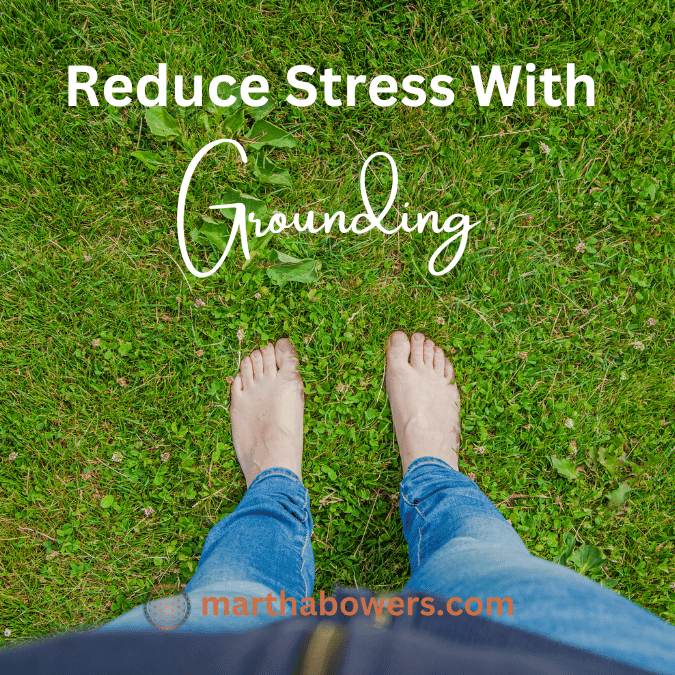My “Reduce Stress Now” Grounding Exercise
Simple steps to reduce stress now! I recommend practicing this exercise outdoors, surrounded by nature, near a serene body of water, or in any picturesque setting. However, if that is not feasible, you can alternatively find the coziest and most tranquil corner of your home.
- Set a timer for the length of time you would like to spend grounding (so you don’t get distracted by having to look at the clock).
- To begin, plant your feet firmly on the ground or focus your attention on the part of your body that has the most substantial connection to the earth. As you connect to the earth
- Clear your mind, take a break from the hustle and bustle of your day, and fully immerse yourself in the present moment.
- Experience the calming sounds of nature while feeling the warmth of the sun. Is there a gentle breeze? What are the sounds of nature that you hear?

How Do I Know If I Have Chronic Stress?
Identifying chronic stress isn’t always straightforward, but being aware of its potential signs can help you take proactive steps toward managing it. Chronic stress can manifest in various ways, affecting your cognitive, emotional, physical, and behavioral well-being. While not everyone will experience all these indicators. Recognizing three to five persisting symptoms over several weeks could suggest chronic stress might be at play. Here are some common signs to watch out for:
Unexplained Aches and Pains: Chronic stress can manifest as physical discomfort without an apparent cause.
Sleep Disturbances: Difficulty falling asleep or staying asleep throughout the night can be a sign of underlying stress.
Change in Social Patterns: If you find yourself avoiding social situations or preferring solitude more often, it might be a response to chronic stress.
Low Energy Levels Feeling: consistently drained or lacking vitality, even after adequate rest, could indicate chronic stress is taking its toll.
Difficulty Concentrating: Chronic stress can cloud your thinking and make it hard to focus on tasks or make decisions.
Changes in Appetite: Stress might cause fluctuations in appetite, leading to overeating or loss of interest in food.
Increased Substance Use: Using alcohol or drugs more frequently as a means to cope with stress can be a red flag for chronic stress.
Emotional Fluctuations: You might notice yourself experiencing heightened emotional reactions or feeling emotionally detached from others.
Social Withdrawal: Chronic stress can lead to a desire to isolate yourself from others or withdraw from social interactions.
Recognizing these signs early on can help you take proactive steps to manage chronic stress and prioritize your well-being. If you resonate with several of these symptoms, consider reaching out to a professional or seeking support from trusted individuals in your life.
Why Does Grounding Reduce Stress Now
Grounding, or grounding techniques, can have several benefits for your mental and emotional well-being:

- Stress Reduction: Grounding can help alleviate stress, anxiety, and overwhelming emotions. It can act as a natural calming mechanism. This process bringing you back to the present moment and reducing the “fight or flight” response triggered by stress.
- Emotional Regulation: Grounding techniques can assist in managing intense emotions. By reconnecting with the physical sensations of your body and your surroundings, you gain a greater sense of control over your emotional responses.
- Mindfulness and Presence: Grounding encourages mindfulness and presence by drawing attention to the here and now. It helps you break free from repetitive thoughts about the past or current worries about the future.
- Relaxation and Rejuvenation: Grounding can promote relaxation and rejuvenation. It offers a break from mental fatigue and can recharge your energy and focus.
- Enhanced Well-Being: Grounding can contribute to an overall sense of well-being, connectedness, and balance. It can also improve your ability to connect with others and build healthier relationships.
- Sleep Improvement: Grounding exercises can help individuals with sleep disturbances or insomnia by calming the body and the mind, making it easier to drift asleep and stay asleep.
- Pain Management: Some individuals use grounding techniques to help manage chronic pain, as it can provide a distraction from discomfort and promote relaxation.
Ultimately, grounding is a valuable tool to enhance your mental and emotional health, incorporating it into your daily routine to increase your sense of well-being and resilience as you face life’s challenges.
Have a Stress Free Day!
(Martha holds certification as a coach specializing in releasing unwanted emotions and breaking recurring behaviors. If you’re facing these challenges, consider registering for a complimentary 30-minute session to explore how her expertise can assist you.)



